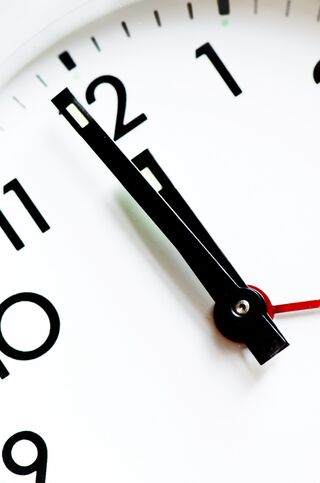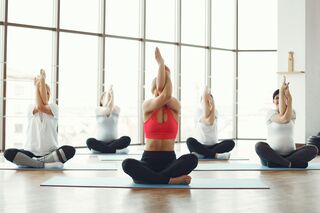Flow
Why Keeping Time Might Prevent You From Being Happy
Letting go of the clock once in a while can be to your benefit.
Posted June 4, 2021 Reviewed by Devon Frye
Key points
- Much of the modern world is centered around clocks and keeping time.
- Yet numerous studies suggest that relying on a clock to start and end activities can lead to reduced happiness and a decreased sense of control.
- Starting and ending activities based on internal cues, at least some of the time, can improve well-being.
In the "Wonder Woman" movie (2017), there is a scene where Wonder Woman sees a watch for the first time and asks Steve what it is for. Steve replies that it tells time—when to eat, wake up, work. Wonder Woman then chuckles and says: "You let this little thing tell you what to do?"

To a stranger who has never been to an industrial world, the concept of using an external cue, such as a watch, to decide on when an activity, such as eating or sleeping, begins or ends might seem unnatural. Yet to many of us, this is our way of living. We wake up at a certain time in the morning, we eat breakfast at a certain time, we exercise at a certain time, go to work at a certain time, and so forth. We would wake up even if we are still tired or we will linger in bed, even if we woke up earlier. We would eat even if not hungry (otherwise we will be hungry later) and we will exercise only for 30 minutes even though today we felt like we could have run for an hour.
Why do we do that? Because, as Wonder Woman said, many of us let the watch dictate to us when to do what, even if we don’t feel like it. I call these people clock-timers, as they order their life based on the clock. I admit I am one of them—or at least I was.
Who is Not Using the Clock?
However, there are some people who refuse to adhere to the clock. They wake up when it is morning; some days it will be earlier, and some days later. They will eat when they are hungry, and not before, and they will run for as long as they feel like it—some days longer than 30 minutes and some days less.
These people, though, do not live without order. But their order is not based on an external cue, like the clock; instead, such people base their order on an internal cue: themselves. They will exercise after they woke up, whenever that might be; they will take a shower after they exercised; and then after the shower, they will go to work. I call these people event-timers, as they order their life based on events that occur to them.

Not all people have the privilege to have flexible waking hours or go to the office sometime in the morning; many of us must adhere to the clock and be at work at a specific time. But in general, most of us do have some flexibility to choose how we want to run our lives. Do we let the clock dictate when to start and end an activity or do we rely on our own sense of completion?
I started to examine this question myself a few years ago when I realized that I still exercise, eat, and shop based on the time of day, even during weekends and vacations where I do not have to be a clock-timer. But habits are hard to break. And besides, why should I break them?
The Less You Rely on the Clock, the Happier You Are
Relying on an external cue, such as the clock, to run your activities definitely has its advantages, but it also has some surprising disadvantages. My research has found that individuals that adopt strict, clock-based schedules are generally less happy and feel like they have less control over their lives than individuals who organize their days by their tasks. Even the presence of a clock alone was found to hinder creative thinking among study participants.

One cool study examined this in a hot yoga class, where yogis were able to follow either an event-timer style or a clock-timer style while practicing their yoga poses. In the event-timer class, instructors were asked to tell the yogis when to enter and leave poses, with no reference to the length of the pose and without any clocks present in the room. In the clock-timer class, instructors were asked to tell in advance how long to hold each pose, and time was tracked using a clock on the wall.
Surprisingly enough, the yogis that were in the clock-timer session missed more poses and gave up more poses than those yogis who were in the event-timer session. Moreover, the clock-timer yogis attributed their performance’s success/failure to the instructors while the event-timer yogis attributed their performance to themselves. This suggests that clock-timer yogis yielded control of their performance to an external entity (instructor) while the event-timer yogis took control over themselves. Finally, event-timer yogis reported higher levels of happiness during the session that lingered a while after, compared to clock-timer yogis.
So what is the bottom line? Over and over again, data shows that people who adopt an event-timer approach are happier and feel more in control. I don’t suggest losing clocks altogether, as they are necessary for functioning in an industrial world. But when possible, on a day off, during yoga, on the playground with your kids, drop the clock. Complete your activity at your own pace, be in touch with your inner feelings, and enjoy the moment.
References
Avnet, Tamar and Anne-Laure Sellier (2011). “Clock Time versus Event Time: Temporal Culture or Self-Regulation?” Journal of Experimental Social Psychology, Vol. 47, (3) May, 665-667.
Sellier, Anne-Laure and Tamar Avnet. (2014) “So What If the Clock Strikes? Scheduling Style, Control, and Well-Being.” Journal of Personality and Social Psychology: Attitudes and Social Cognition, Vol 107(5), Nov, 791-808.


